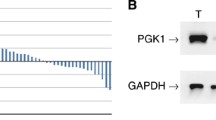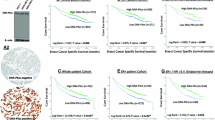Abstract
Glycogen synthase kinase 3β (GSK3β) is phosphorylated and inactivated by the phosphoinositide 3 kinase PI3K/Akt pathway. Activation of Akt phosphorylates GSK3β preventing phosphorylation of cyclin D1 which leads to accumulation and nuclear localisation of cyclin D1, activation of CDK4/6 and cell cycle progression. The CCND1 gene found at chromosome 11q13 has been shown to be amplified in approximately 15 % of breast cancers. Cyclin D1, the product of the CCND1 gene, is one of the most commonly overexpressed proteins in breast cancer. Protein expression for GSK3β, phosphorylated-GSK3β (p-GSK3β), cyclin D1 and gene expression of CCND1 were examined in tissue microarrays of 1,686 patients from the Edinburgh Breast Conservation Series. High GSK3β expression was associated with reduced distant relapse-free survival (DRFS), while no association between p-GSK3β and breast cancer-specific survival was seen. CCND1 amplification is also associated with poor DRFS. On the contrary, cyclin D1 overexpression is associated with an increase in DRFS. Multivariate analysis was performed. We suggest that analysis of both GSK3β and cyclin D1 expressions can be considered as a marker of good prognosis in early breast cancer.




Similar content being viewed by others
References
Embi N, Rylatt DB, Cohen P (1980) Glycogen synthase kinase-3 from rabbit skeletal muscle. Eur J Biochem 107(2):519–527
Woodgett JR, Cohen P (1984) Multisite phosphorylation of glycogen synthase. Molecular basis for the substrate specificity of glycogen synthase kinase-3 and casein kinase-II (glycogen synthase kinase-5). Biochim Biophys Acta 788(3):339–347
Cohen P, Alessi DR, Cross DAE (1997) PDK1, one of the missing links in insulin signal transduction? FEBS Lett 410(1):3–10
Pap M, Cooper GM (1998) Role of glycogen synthase kinase-3 in the phosphatidylinositol 3-kinase/Akt cell survival pathway. J Biol Chem 273(32):19929–19932
Doble BW, Woodgett JR (2003) GSK-3: tricks of the trade for a multi-tasking kinase. J Cell Sci 116(7):1175–1186
Shimura T, Kakuda S, Ochiai Y et al (2010) Acquired radioresistance of human tumor cells by DNA-PK/AKT/GSK3[beta]-mediated cyclin D1 overexpression. Oncogene 29(34):4826–4837
Roy PG, Thompson AM (2006) Cyclin D1 and breast cancer. Breast 15(6):718–727
Goto H, Kawano K, Kobayashi I et al (2002) Expression of cyclin D1 and GSK-3beta and their predictive value of prognosis in squamous cell carcinomas of the tongue. Oral Oncol 38(6):549–556
Thomas JS, Kerr GR, Jack WJL et al (2009) Histological grading of invasive breast carcinoma-a simplification of existing methods in a large conservation series with long-term follow-up. Histopathology 55(6):724–731
Kunkler IH, Kerr GR, Thomas JS et al (2011) Impact of screening and risk factors for local recurrence and survival after conservative surgery and radiotherapy for early breast cancer: results from a large series with long-term follow-up. Int J Radiat Oncol Biol Phys
Leyland-Jones BR, Ambrosone CB, Bartlett J et al (2008) Recommendations for collection and handling of specimens from group breast cancer clinical trials. J Clin Oncol 26(34):5638–5644
Kirkegaard T, McGlynn LM, Campbell FM et al (2007) Amplified in breast cancer 1 in human epidermal growth factor receptor positive tumors of tamoxifen-treated breast cancer patients. Clin Cancer Res 13(5):1405–1411
Kirkegaard T, Edwards J, Tovey S et al (2006) Observer variation in immunohistochemical analysis of protein expression, time for a change? Histopathology 48(7):787–794
Bartlett JMS, Going JJ, Mallon EA et al (2001) Evaluating HER2 amplification and overexpression in breast cancer. J Pathol 195(4):422–428
Ellis IO, Bartlett J, Dowsett M et al (2004) Best practice No 176. J Clin Pathol 57(3):233–237
Zheng Hc, Xu Xy, Xia P et al (2010) Involvement of inactive GSK3beta overexpression in tumorigenesis and progression of gastric carcinomas. Hum Pathol 41(9):1255–1264
Luo J (2009) Glycogen synthase kinase 3beta (GSK3beta) in tumorigenesis and cancer chemotherapy. Cancer Lett 273(2):194–200
Armanious H, Deschenes J, Gelebart P et al (2010) Clinical and biological significance of GSK-3beta inactivation in breast cancer––an immunohistochemical study. Hum Pathol 41(12):1657–1663
Huac Z, Hiro S, Shin M et al (2007) Phosphorylated GSK3beta Ser9 and EGFR are good prognostic factors for lung carcinomas. Anticancer Res 27(5b):3561–3569
Reis-Filho JS, Savage K, Lambros MBK et al (2006) Cyclin D1 protein overexpression and CCND1 amplification in breast carcinomas: an immunohistochemical and chromogenic in situ hybridisation analysis. Mod Pathol 19(7):999–1009
Gillett C, Smith P, Gregory W et al (1996) Cyclin D1 and prognosis in human breast cancer. Int J Cancer 69(2):92–99
Bilalovic N, Vranic S, Basic H et al (2005) Immunohistochemical evaluation of cyclin D1 in breast cancer. Croat Med J 46(3):382–388
Oyama T, Kashiwabara K, Yoshimoto K et al (1998) Frequent overexpression of the cyclin D1 oncogene in invasive lobular carcinoma of the breast. Cancer Res 58(13):2876–2880
Staal FJT, Clevers HC (2005) WNT signalling and haematopoiesis: a WNT–WNT situation. Nat Rev Immunol 5(1):21–30
Conflict of interest
The authors have indicated that they have no financial conflict of interest.
Author information
Authors and Affiliations
Corresponding author
Additional information
M. A. Quintayo and A. F. Munro are joint first authors.
Electronic supplementary material
Below is the link to the electronic supplementary material.
Rights and permissions
About this article
Cite this article
Quintayo, M.A., Munro, A.F., Thomas, J. et al. GSK3β and cyclin D1 expression predicts outcome in early breast cancer patients. Breast Cancer Res Treat 136, 161–168 (2012). https://doi.org/10.1007/s10549-012-2229-8
Received:
Accepted:
Published:
Issue Date:
DOI: https://doi.org/10.1007/s10549-012-2229-8




